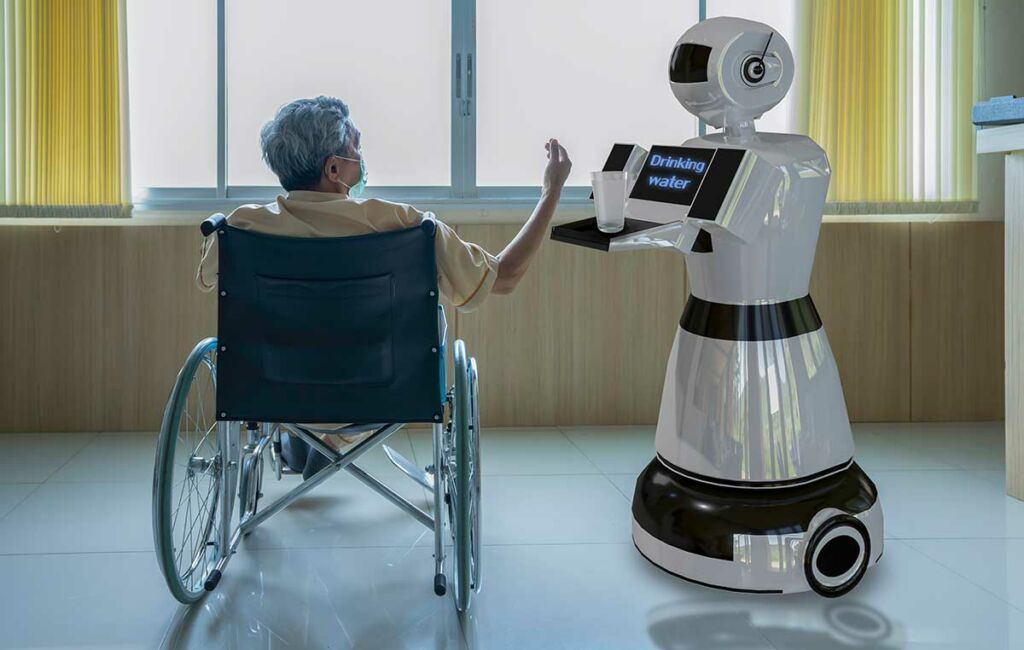Major revolution in sight for medicine. Artificial intelligence (AI), which has recently experienced rapid development, is poised to profoundly transform the diagnosis, treatment and monitoring of patients. Sophisticated algorithms, capable of analyzing complex medical data with unparalleled precision and speed, are paving the way for unprecedented advances. This is in particular the ability to analyze and process large quantities of data by AI, which has already started, and which should change the situation in the coming years.
But this technological revolution is also accompanied by ethical challenges and controversies that need to be addressed. How can we guarantee the reliability of algorithms and the protection of patient data? How can we ensure that AI does not replace human expertise and judgment, but rather complements them? So many crucial questions to which we must find the right answer before integrating artificial intelligence in an all-out way.
Artificial intelligence, a diagnostic aid that is already very present
It is already a reality: AI is revolutionizing medical diagnosis. According to the DREES (Directorate of Research, Studies, Evaluation and Statistics), in 2020, some 10 million medical imaging procedures (scanner, MRI, etc.) were carried out in public establishments and private non-profit organizations in France. It is also estimated that during an 8-hour working day, a radiologist will have to interpret an image every 3 to 4 seconds on average. This is considerable…and the possibility of error is great. It is therefore not surprising that AI has been prioritized in this area. In the USA, of all medical devices compatible with AI authorized by the Food and Drug Administration, 79% concern radiology (then cardiology and neurology). At the start of 2024, 38% of professionals in the sector say they have integrated AI into their process and 62% plan to implement it within the next five years.
Same story in dermatology, where AI is proving more effective than the human eye. A 2018 study showed dermatologists were 86.6% accurate in diagnosing skin cancer (differentiating between benign lesions and disease). The computer was able to identify carcinogenic lesions with 95% accuracy. In the field of genetic analyzes too, artificial intelligence has real added value because they take a very long time to carry out due to the volume of data to be processed. AI knows how to sift through a mass of data and provide a restricted list of variants responsible for genetic syndromes. In the process, a healthcare professional will make a diagnosis more quickly, based only on this range of pre-identified hypotheses.
A booming ecosystem
In France in 2023, there were 591 start-ups which had put AI at the heart of their business. Among them, 15% are dedicated to health, according to France Digitale. HealthTech is the second main field after data/cloud storage. In addition to investments by healthcare establishments, the pharmaceutical industry has also shown its interest in AI in recent years. “ Artificial Intelligence Helped Us Double Our Speed of Vaccine Development. This is what allowed us to determine which mutations we needed to look for and accelerate the commercialization of the COVID-19 vaccine » explains Kate Cronin, brand director at Moderna. Before adding that, thanks to AI, they were able to “ decode COVID in 48 hours “.
In stock
Buy on Fnac.com
Identification and selection of new molecules, participation in clinical trials to reduce the failure rate and accelerate the marketing of new drugs… It is throughout the development cycle of a new drug that AI can lend a hand. Proof of this is with the tour de force of Sumitomo Dainippon Pharma and the British pharmaTech Exscientia who created the first molecule assisted by AI in 2020. Its development process was reduced from 5 years to 12 months thanks to intelligence artificial. Intended to treat Obsessive Compulsive Disorder (OCD), it was tested on humans in Japan in 2020.

Will artificial intelligence improve healthcare?
This is the big question in the end. So far, technology has done little to improve this area. How could an algorithm take care of a patient? In reality, AI could play a role in simplifying “back-office” tasks that encroach on the value-added working time of healthcare professionals. Artificial intelligence could intervene to simplify the administrative flow. We can imagine a certain automation of all the paperwork. Generative AI is also capable of helping clinicians take notes, make study summaries, keep medical records as complete as possible, and ensure there are no errors therapeutic dosage, etc. This could even be pushed as far as sharing information between departments and invoicing.
AI also has its role to play directly with the patient to answer certain questions when medical staff are not available. A question about late night medication? Do you need to have the procedure of the upcoming operation completely clarified? Any questions about the appropriate diet based on your treatment? All of this can be handled through a chatbot. And thus free up more time for nurses, for example, for personal care. Some also imagine robots available in hospitals and available 24 hours a day to discuss anything and everything.

Many ethical challenges in medical AI
The use of artificial intelligence in medicine raises major ethical concerns, particularly regarding data bias. AI algorithms, while highly efficient, depend on the quality and diversity of the data they are trained on. There is a risk that these systems will perpetuate or exacerbate existing biases if data sets are not representative of the full diversity of populations. Too much data on light-skinned people or men rather than women could weigh on diagnoses and lead to disparities in health care. It is necessary to put in place safeguards to guarantee fairness in medical treatment.

Another key ethical issue is protecting the confidentiality of patient data. With AI capable of analyzing vast amounts of medical data, the risk of privacy breaches increases. It is essential to have rigorous measures in place to secure patient data and ensure it is used ethically. Additionally, patient consent plays a central role; they must be clearly informed of how their data is used, the expected benefits and the potential risks. This requires transparent policies and consent procedures that respect both individual rights and ethical standards.










